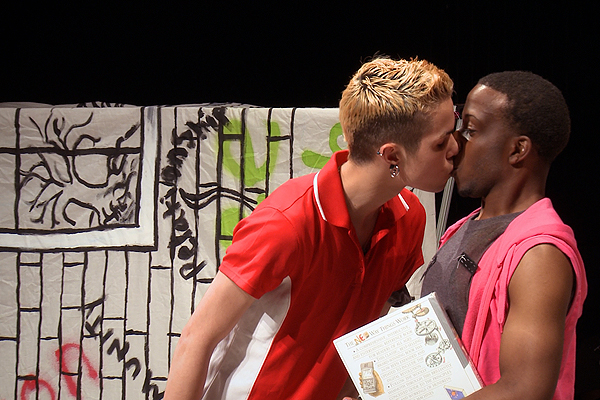
Co- written by Lyne Dwyer
Boston’s True Colors: OUT Youth Theatre is America’s oldest queer youth theatre. During the 2012-2013 school year, Ellen Brodsky took her camera into their rehearsal space.
She found a group of 14- to 19-year-olds putting their personal histories on stage. The goal for these writers and performers is transformation of both self and society.
The Year We Thought About Love (Canada, 2014) was the closing film of the ReFrame Film Festival. Brodsky’s documentary successfully conjoins interviews of the writers/actors in which they narrate their lives parallel to a stage production about those experiences. Some of the
stories are heart-wrenching, such as Alyssa’s gender transition and rejection from her family, but many are about young love.
The acting out of these love stories seemed to generate positive experiences for the LGBTQ teens. The short plays legitimize their loves and romances, thereby revealing deep emotions and physical attractions that had perhaps remained hidden for most their lives.
The teens frequently discuss having to hide their sexualities. These public outings on the stage come to be fueled by the optimism of the True Colors director – who went through his own familial issues with his sexuality – as well as the audience’s.
The film returns again and again to one of the troupe’s largest productions at a local high school. They are greeted with cheers and applause, as well as both serious and humorous questions.
The occasional shot shows a mix of surprise and perhaps disapproval from some of the high school’s teenaged boys.
While the film feels generic in its structure, and the “One Year Later” ending is disturbingly conventional – it suggests that True Colors ensures or produces happiness (in fact, only a few of the teens were interviewed for this final segment: were the others not happy enough to make it into the ending?) – the greatest achievement of the film is simply showing us real teens with real experiences and issues.
The hope, I assume, is that others can find these personal stories and artistic expressions relatable and inspiring.
Moreover, teenaged and young adult spectators who also find heteronormativity problematic will learn that they aren’t alone. A perfect documentary for the high school classroom.


